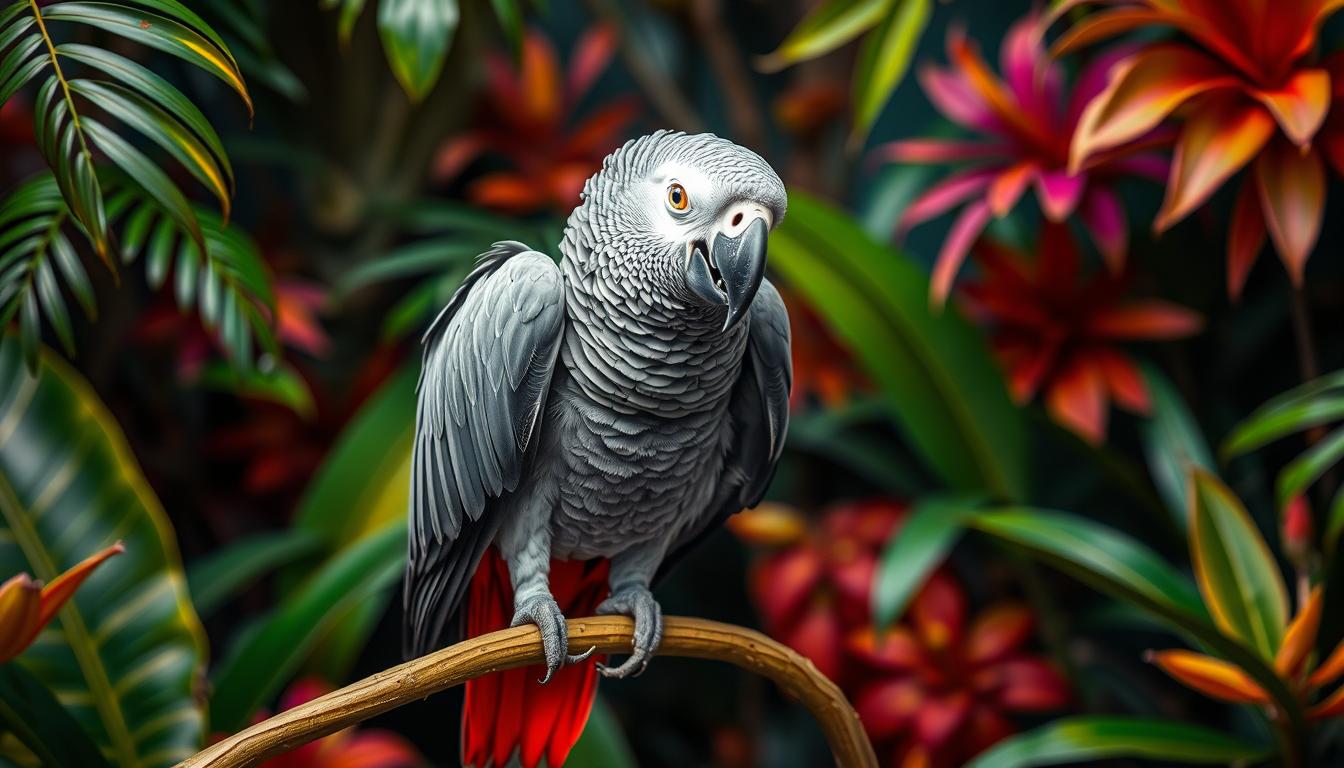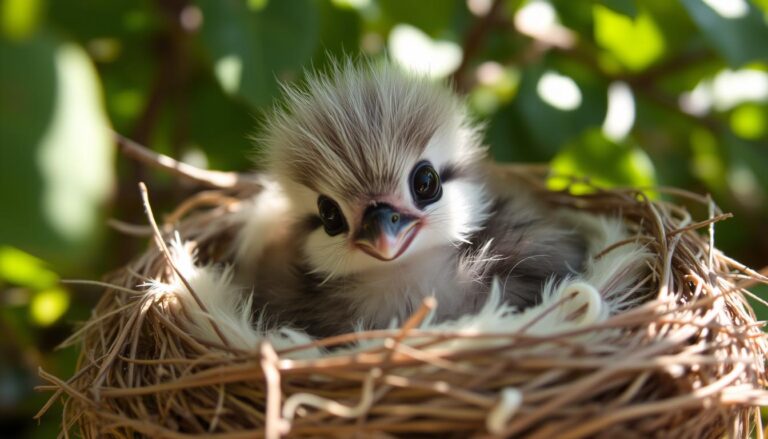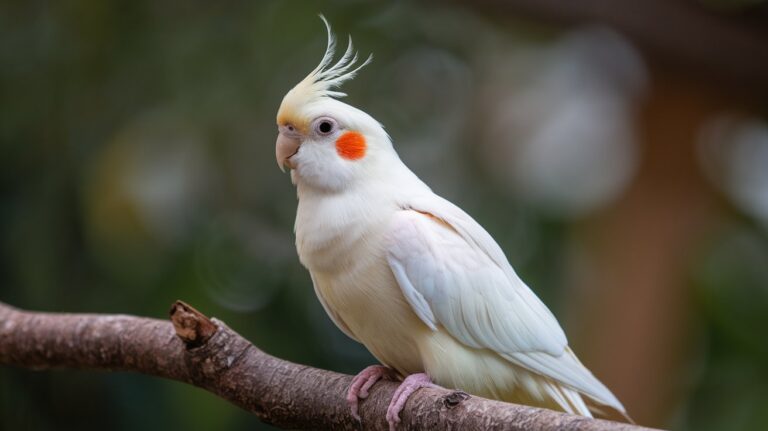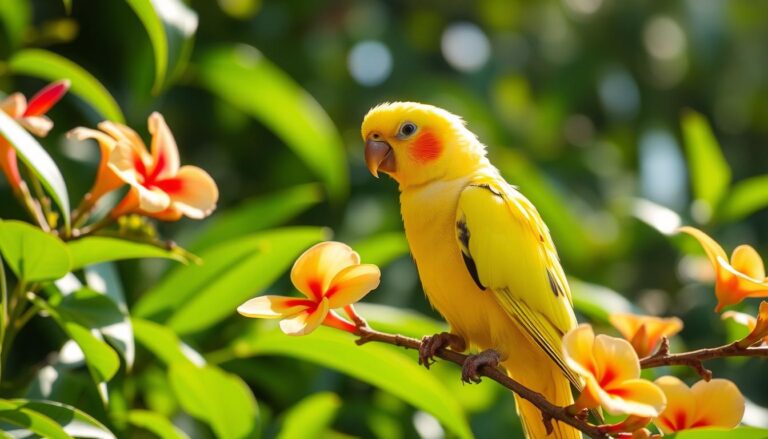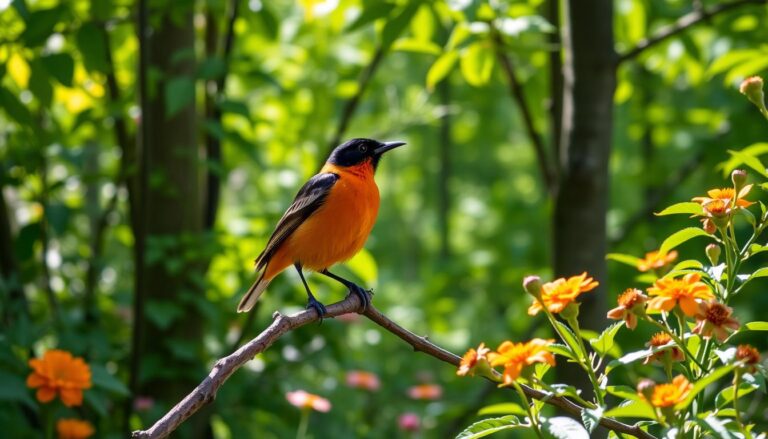African Grey Parrot Personality Traits You Need to Know
I’ve always been fascinated by African Grey Parrots. Their intelligence and unique personalities are unmatched. They can mimic human speech and solve problems, making them special.
Thinking of getting an African Grey Parrot? It’s important to know their personality and care needs. They are social, emotional, and need lots of attention. This article will help you understand them better and care for them well.
| Attribute | Details |
|---|---|
| Official Name | Psittacus erithacus |
| Common Name | African Grey Parrot |
| Pet Height | 12–14 inches (30–36 cm) |
| Pet Weight | 400–650 grams |
| Lifespan | 50–70 years |
| Smartness Level | Extremely high (top-tier) |
| Engagement in Play | Very active and playful |
| Human-Friendly | Highly social and affectionate |
| Animal-Friendly | Generally cautious, varies |
| Favorite Food | Seeds, nuts, fruits, and vegetables |
Table of Contents
Overview of African Grey Parrots
The Congo African Grey and the Timneh African Grey are two amazing parrot species. They live in the rainforests and woodlands of West and Central Africa. These birds are smart and charming, making them great pets and friends.
General Characteristics
The Congo African Grey is bigger, weighing 400-650 grams and growing 12-14 inches long. They have light grey feathers and a bright red tail. The Timneh African Grey is smaller, weighing 250-375 grams and growing 9-11 inches long. They have darker grey feathers and a maroon tail.
Habitat and Origin
Both the Congo African Grey and the Timneh African Grey live in forests. They like lowland rainforests, gallery forests, mangroves, and wooded savannahs. The Congo African Grey lives from northeastern Ivory Coast to western Kenya. The Timneh African Grey is mainly found in the western Ivory Coast and Guinea.
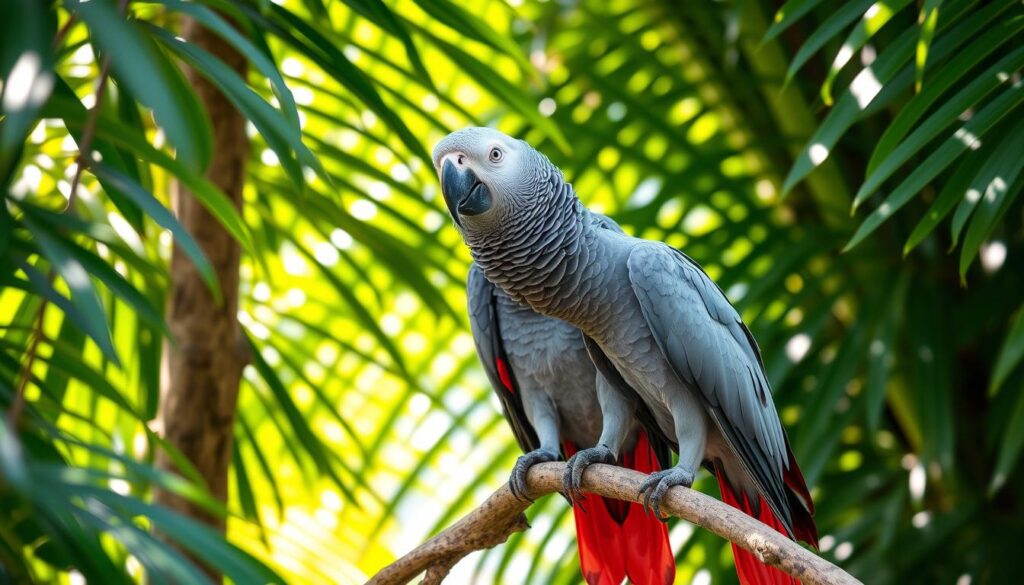
These parrots are very smart and can mimic sounds. They also have complex social behaviors. This makes them popular pets. With the right care, they can live happily with their owners for many years.
Understanding Their Intelligence
African Grey Parrots are incredibly smart. They solve problems and understand complex ideas better than many birds. This makes them stand out in the world of bird intelligence.
Problem-Solving Skills
These birds are great at figuring things out. They can learn about zero and mix different ideas together. They even mimic human speech clearly.
Communication Abilities
African Grey Parrots are amazing at talking. They can learn hundreds of words and use them correctly. This skill makes them one of the smartest bird species.
These parrots are not just smart. They can solve problems and think deeply. They even delay getting what they want, a skill thought to be human.
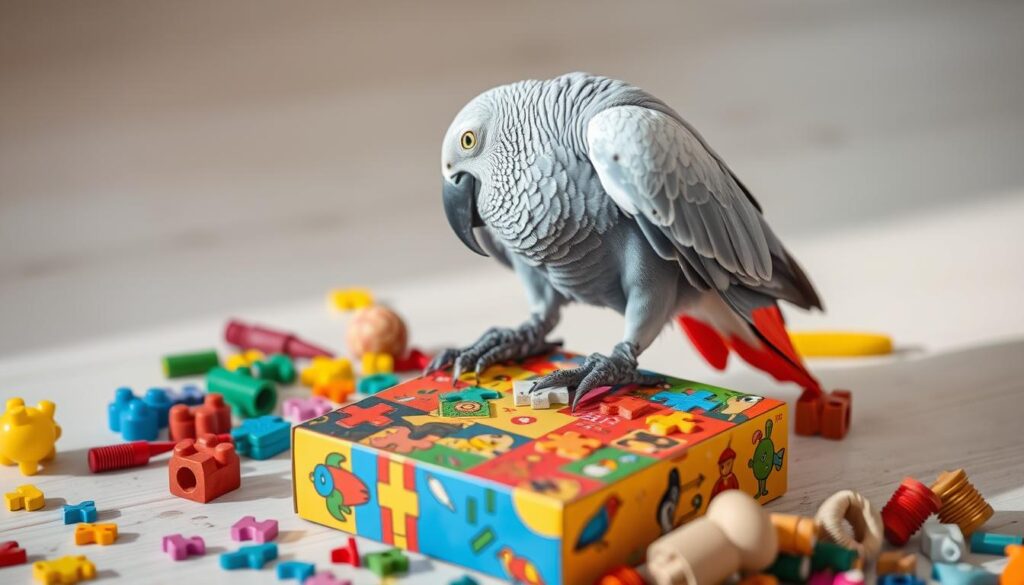
When we compare parrots to other smart animals, like crows and apes, they are on par. Their intelligence is fascinating to researchers and bird lovers. The African Grey Parrot’s smarts are truly impressive.
Social Behavior of African Grey Parrots
African Grey Parrots are very social and form strong bonds with their owners. They need regular interaction and companionship to be happy. At first, they might be shy around new people, but they are very loyal to those they trust.
These parrots can get along with many people if they feel safe and trusted.
Interaction with Humans
In the wild, African Grey Parrots live in groups and are very social. They have even been known to help other birds in need. As pets, they can become very attached to one person, sometimes getting aggressive with others, especially when they’re breeding.
Bonding with Other Birds
African Grey Parrots are monogamous, meaning they mate with only one partner. In the wild, they live in large groups, sometimes with thousands of birds. Without enough social interaction, they can get stressed and even hurt themselves by plucking their feathers.
| Statistic | Value |
|---|---|
| UAround 21% of African grey parrots in the wild are illegally captured annually. | 21% |
| African grey parrots have an average lifespan of 60 years, with some living up to 80 years. | 60-80 years |
| Fully grown African grey parrots have shown intelligence levels comparable to toddlers. | Toddler level |
| They can identify, request, refuse, categorize, and quantify over 80 different objects. | 80+ objects |
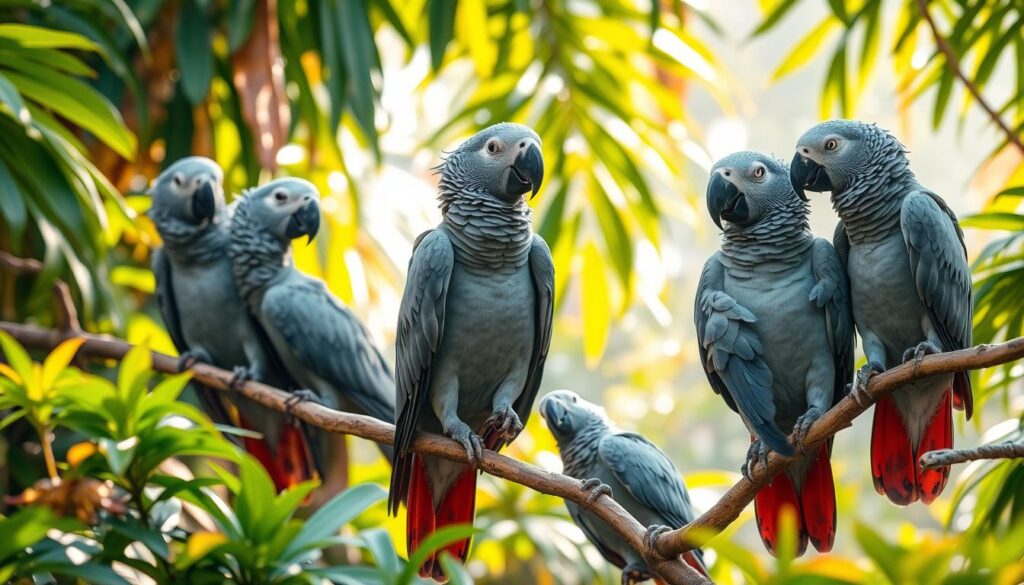
African Grey Parrots are loved for their smartness and alertness. They need lots of stimulation, like safe toys and social time, to be happy and healthy.
Playfulness and Curiosity
These parrots are famous for being both playful and curious. They make great companions. These smart birds need mental challenges and enjoy various toys and activities.
It’s important to keep them engaged to prevent boredom. This helps them stay natural and happy.
Playful Activities
African Greys love to explore and play. They enjoy climbing, swinging, and solving puzzles. Give them a variety of toys like wooden blocks, rope perches, and puzzle feeders.
Change their toys often to keep them interested. This keeps your African Grey happy and active.
Let your parrot play outside of their cage. This gives them space to move and play. It’s ideal for creating a closer relationship with your bird.
Safe Toys for Your African Grey
- Wooden toys: Blocks, chew toys, and puzzles that allow your parrot to explore and manipulate
- Rope toys: Swings, perches, and ladders that encourage climbing and movement
- Foraging toys: Puzzle feeders and food-hiding toys that stimulate their natural foraging instincts
- Interactive toys: Toys that require your parrot to problem-solve, such as shape-matching or lever-activated treats
Always check and change your African Grey’s toys. This keeps them safe and fun. By meeting their playful needs, you’ll strengthen your bond with them.
Vocalization and Speaking Skills
African Grey Parrots are known for their amazing ability to mimic sounds. They can mimic human voices, sounds, and even tunes. Their syrinx, the bird’s vocal organ, lets them speak clearly and with feeling.
Unlike other animals, parrots can mimic human speech thanks to their brain structure. This is due to their environment and brain similarities to humans.
Variety of Sounds
African Grey Parrots can memorize undreds of words and sentences. A 2022 study showed they are among the best at mimicking sounds. Other birds like cockatoos and macaws also have great mimicry skills.
However, some birds like Pacific parrotlets and sun conures are less likely to mimic sounds.
Training Tips for Talking
To get your African Grey Parrot to talk, repeat words and phrases clearly and with excitement. Link them to actions or objects. Use treats or praise to encourage them.
Remember, each parrot is different in their speaking abilities. As we learn more about parrots’ language skills, we’ll understand how they grasp and use speech.
| Parrot Species | Mimicry Ability |
|---|---|
| African Grey Parrot | Exceptional |
| Amazon Parrot | Excellent |
| Budgerigar (Parakeet) | Good |
| Pacific Parrotlet | Limited |
| Sun Conure | Limited |
The study of parrots’ language skills is growing. This research gives us hope for understanding how parrots grasp and use speech. With proper training and a strong bond, African Grey Parrots can impress with their speaking talents.
Emotional Complexity of African Grey Parrots
African Grey parrots are not just smart birds; they also have deep emotions. They can feel joy, love, stress, and anxiety. Knowing what they need emotionally is key to their happiness and health.
Signs of Stress or Anxiety
Stress or anxiety can hit African Greys for many reasons. This includes changes in their home, not enough social time, or unmet needs. Look out for signs like feather plucking, loud screaming, being aggressive, or hiding. Watching your parrot closely can help spot and fix these issues.
Importance of Mental Stimulation
Keeping your African Grey’s mind active is vital for their emotional health. These smart birds love to play, interact, and explore their surroundings. Give them puzzle toys, change their toys and perches, and teach them new tricks. This keeps them happy and stress-free.
“Parrots, like the African Grey species, can learn and mimic sounds throughout their lives, showcasing their vocal learning abilities.”
Having a regular routine and a safe, cozy home also helps your African Grey feel secure. By understanding and meeting their emotional needs, you can make sure they live a joyful and healthy life with you.
The Importance of Consistent Routine
African Grey parrots are very smart and sensitive. They love a routine that makes them feel safe and happy. A daily schedule helps them stay healthy and reduces stress.
Setting a Daily Schedule
A good day for an African Grey parrot includes:
- Set times for eating fresh fruits, veggies, and special pellets
- Playtime outside their cage for fun and learning
- Time to bond with their owners
- Quiet breaks for rest
Feeding and Care Routine
Feeding your African Grey parrot right is key. They need a mix of fresh foods, good pellets, and a little bit of seeds and nuts. Always have clean water ready. Also, don’t forget to groom them regularly.
Keeping a steady parrot care schedule and bird daily routine is vital. It keeps them happy and healthy. This is especially true for these clever birds.
“Consistency is the cornerstone of a happy and healthy African Grey parrot. A predictable routine helps them feel secure and minimizes stress, allowing them to thrive.”
Grooming and Maintenance Needs
Keeping your African Grey Parrot clean is key to their health. Regular baths or misting keep their feathers healthy. It also helps them preen naturally. During molting, which happens 1-2 times a year, they need extra nutrients and care.
Feather Care and Molting
It’s important to keep your African Grey’s feathers in good shape. Give them perches of different textures to wear down their nails and beak. Also, regular vet visits are crucial to catch health issues early.
Beak and Nail Maintenance
Trimming your parrot’s beak and nails is vital. A vet should do this to avoid overgrowth. Overgrown nails and beaks can be painful and lead to serious health problems. Make sure they have perches to naturally wear down their nails and beak.
| Grooming Requirement | Frequency | Importance |
|---|---|---|
| Bathing or Misting | Regular (3 times per week) | Maintains feather health and encourages natural preening |
| Molting | 1-2 times per year | Requires extra nutrients and care to support feather growth |
| Beak and Nail Trimming | Regular veterinary visits | Prevents overgrowth and potential health issues |
| Perch Variety | Ongoing | Helps naturally wear down nails and beak |
By focusing on parrot grooming, bird feather care, and avian health maintenance, you can keep your African Grey Parrot healthy and happy.
Health Considerations and Behavior
African Grey Parrots are smart and fun to be around. They need careful care to stay healthy. These birds can get sick with things like respiratory infections and feather plucking. It’s important to feed them a diet full of calcium and vitamin A to avoid serious problems.
It’s also key to watch for avian diseases that can harm your bird. Eating too much food that’s high in carbs and fats can lead to health issues. Also, eating things like avocado or heavy metals can hurt their stomach and nervous system.
Common Health Issues
African Grey Parrots can face many health problems, like tumors and virus diseases. Visiting the vet often ensures good health. Look out for changes in their eating, droppings, or energy levels. They could signal an illness.
Observing Behavioral Changes
Watching for bird behavior changes is also important. Changes in behavior can mean health problems or stress. If your parrot becomes aggressive, talks too much, or sleeps differently, they might need a vet. Keeping their environment clean and their diet balanced can help prevent many health issues.
“Proactive prevention and early intervention are key to maintaining the health and happiness of your African Grey Parrot.”
| Common Health Issues | Causes | Symptoms |
|---|---|---|
| Vitamin A and Calcium Deficiencies | Imbalanced diet | Kidney failure, muscle weakness |
| Fatty Deposits and Organ Dysfunction | High-carb, high-fat diet | Compromised organ function |
| Gastrointestinal and Nervous System Issues | Ingesting toxins (avocado, heavy metals) | Digestive problems, neurological issues |
| Tumors, Virus Diseases, and Beak/Feather Disorders | Various infectious agents | Organ damage, immune system issues, feather abnormalities |
Creating a Stimulating Environment
It’s key to keep your African Grey Parrot happy and healthy. Make sure their cage is big, at least 2 feet deep by 3 feet wide by 4 feet tall. Add lots of perches, swings, and toys to keep them busy.
Try enrichment activities like foraging toys and puzzle feeders. Change up the toys often to keep your bird’s mind sharp.
Enrichment Activities
Parrots have the intelligence of a young child. Without mental challenges, they might scream, destroy feathers, or get aggressive. It’s vital to keep them mentally active.
Give them different toys each week. Try foraging, destructible, puzzle, and teach & learn toys. Also, teach them new words and tricks.
Safe Space for Your Parrot
Having a safe area outside for your parrot to explore is great. Make sure it’s free from dangers like toxic plants and open windows. A variety of textures, colors, and sounds will keep them interested.
Exposing them to new things regularly is important. It helps prevent boredom and keeps their mind healthy.

